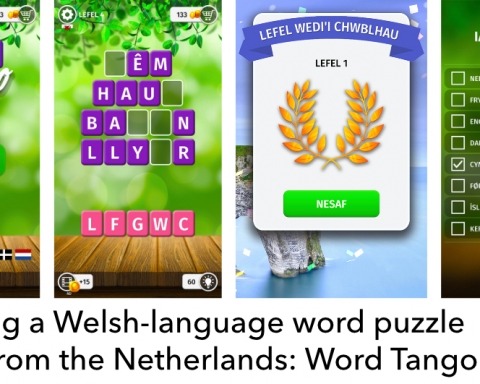Jaz-Michael King is the creator of Tŵt, a community microblog built from the ground up in Welsh and English versions, with the aim of creating a bilingual, privacy-focussed social media experience. Born and raised in South Glamorgan, Jaz now lives and works in the USA. Michael Hickins is Director of Media Strategy at Oracle, and was previously an Editor at the Wall Street Journal, and here Mike asked Jaz about his latest creation.
Tŵt is available online or mobile at toot.wales
You once launched a Web services company called MerlinWeb. Are you obsessed with Wales, or was that just a coincidence?
In everything I do, I try to sell Wales a little bit. I believe we have a unique culture and spirit from which comes a great sense of personal pride and belonging, and I love sharing that with anyone and everyone. My very first business was a shop called Merlin’s Cave, there’s definitely a theme there.
Why do you think Welsh people need their own Twitter?
I don’t. I believe every community needs their own Twitter. We built the Web to liberate content, not hide it behind proprietary paywalls and data-mining conglomerates. Tŵt is a decentralised, privacy-first microblog that ensures each individual user owns their content, can delete it, take it somewhere else, and have complete control over who can see and interact with their “Tŵtiau” (“Toots”). Then add in the stated aim of encouraging bilingual conversation on the Web. If I was a dog lover I’d have built Woofer instead of Tŵt, but here we are.
Does this mean you don’t like dogs?
I love dogs, but I find them hard to communicate with online. I think it’s their lack of thumbs- they can’t type or text well.
How is Tŵt different from just following a bunch of Welsh people on normal Twitter?
Well first off, it’s not a competition. Anyone can participate in both fora. However, Tŵt offers a Welsh language interface which Twitter does not, and a native Welsh language capability for posting and reading; and Tŵt is intended to be a more intimate online setting, recalling community Web forums of the nineties. Couple that with a clear guide to acceptable content and activity, Tŵt is in many ways a response to the fake news/online abuse/noise fest that the larger sites simply can’t moderate or really get a handle on. Twitter is a communications medium; Tŵt is a community.
How does an online community of like-minded folks compare with In Real Life? Are they complementary, and if so, how?
Tŵt first came to me in a Welsh restaurant in New York – the much-loved-although-sadly-closed Cantre’r Gwaelod – where a bunch of us Cymry were gathered. I was chatting with a mate and another acquaintance of his joined in to say hi and they switched to Welsh for their portion of the conversation. Growing up in 70s and 80s Wales, there was a lot of suspicion and even venom against the language from many corners, but here in New York thirty years on we were effortlessly switching one to the other and it was warm, welcome, and heartening. There’s a lot of politics around the language, with arguments over things like which version of a village name goes first on the road signs, how much money should be spent on Welsh language initiatives etc. So I wanted to recreate that NYC experience online, but without the politics. Tŵt is not a pro-Welsh political endeavor. It’s simply a medium that says “you can use this thing in the language of your choice, you can post in the language of your choice, and you’ll be replied to in the language of that replier’s choice. Figure it out.” Most specifically, I want an online experience where Tooting something in one language and being replied to in another is normal and acceptable.
The political arguments are similar to arguments in Spain and France around Basque and other “majority-minority” languages, where road signs are bilingual, etc.. Language is obviously vital to the health of a culture, particularly when that culture is subsumed by another, larger one. Do you know of other efforts similar to yours for Welsh?
I was just yesterday invited to a meeting “Promoting Multilingual Societies: Perspectives from Wales, The Basque Country, Flanders and Quebec” so I’ll ask them when I see them. I recently happened upon the SaySomethingInWelsh forums which are a treasure trove of similar activity, and Parallel.cymru is a fascinating bilingual magazine where content is in both languages side by side on the page. Right as we started translating the service I bumped into Carl Morris and Rhos Prys of Hacio’r Iaith who are heavily engaged in Welsh-language technology, and they offered some great advice based on their experience in this area.
Twitter itself was once a hobby for three guys, two of whom had strange names. Then came market forces and the laws of large numbers and it became the cacophony of phoniness that we know and despise today. How do you keep that from happening? Conversely, how the heck do you manage this all by yourself? And is it healthy for a community forum to be managed by just one person?
I am in the process of incorporating a charity to take ownership of Tŵt such that it can never be sold or profited from. Tŵt will never accept advertising fees. My goal is to reach somewhere between 50,000 and 100,000 members; I don’t think the model can go much farther than that. However, Tŵt is built on an open source platform called Mastodon, which allows anyone to set up their own “instance” – their own personal Tŵt. I hope that as we get bigger others might form their own friendly, neighbouring instances to focus on particular subjects or communities, maybe photography, maybe religion, maybe music… As for how I manage it by myself, I don’t sleep much. And it really shouldn’t be just me for too long, I’ll push the boat out but others are going to have to row. I believe there’s a gap in the market, I believe Tŵt brings innovation and value, and if others feel the same, they will eventually outweigh me.
Are you promoting Tŵt in any way? Just word of mouth or… Twitter?
I’ve posted a few bits and pieces on other social network sites, mainly in the form of “if you’re not having fun here, why not try Tŵt?”, and a few ads here and there. But for the most part I’m hoping to get the word out through our early adopters and content providers – we’re at around 150 people right now in our first month – and if we can demonstrate fun and value to them I think they will bring their friends and followers.
To save folks the trouble of reading your Ts and Cs, are there policies banning people from swearing etc.?
Tŵt is a community proposition, and while I have the helm for a short while I intend to let the community decide these things. Tŵt has built-in privacy to restrict your audience and content warning capabilities to hide content behind a spoiler alert; however we will always draw the line at racism, sexism, discrimination against gender and sexual minorities, xenophobia and/or violent nationalism. We may ask that that be hidden behind a content warning, or we may point to more appropriate venues for such content.
It seems pretty clear that sex and money motivate people most of the time. What will draw people to Tŵt?
I think you make a sweeping statement which is easily refuted by the millions of people posting pictures of their cats. I really believe the Web to be a powerful vehicle for freedom and equality in the world, and having worked on many moderated communities since the mid-nineties I do think there’s a space for Tŵt to exist and a group of people who will derive some measure of value from it. How big that group is remains to be seen. For me, it’s simply a safer – and saner – space than most to connect with my fellow Welsh back home and around the world. I hope that it can be that to others, too.
You’re a Welsh expatriate living in New York. If you were to return to Wales, would you continue managing this site for as long as you otherwise intend?
I will keep on shepherding Tŵt until it’s dead or bigger than I can manage, wherever I may be. Right now I’m planning to go for two years and see where we are then.
Is this primarily a community for other Welsh expats, or do you think folks in Wales will also participate? (Or do they already?)
It’s aimed more at home than away, although I envision it being a great way for the diaspora to connect. Our early members are about three quarters Wales-based, and a quarter Welsh diaspora and Welsh learners. I’ve recently bought some hand-painted decorations from a young Welsh artist in South Africa through Tŵt, and I met a German chap who is a rugby fan and is learning Welsh, and we swap notes on the Six Nations matches. As a technologist I live by three rules of software development, and the second one is “The Users Will Subvert the System” – so I fully expect and welcome the platform taking on a life of its own as it adapts to its user base.
Then I guess I hope they do, as that will be a great measure of its success!
Diolch i ti Mike!







